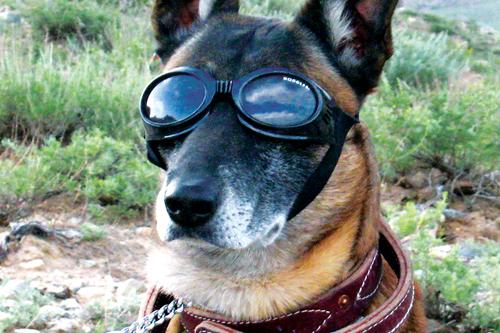Phuket Pets: Working dogs

PHUKET: Previously we have looked at the power of canine senses. Most of us are aware of some of the uses these powers are put to: guide dogs for the blind or police dogs sniffing out drugs or explosives at airports. But the role of the humble dog in our lives is vast and they are doing much more than many of us are aware.
Race against time
In the aftermath of natural disasters such as tsunamis or earthquakes, it’s a race against time to get to survivors and bring them to safety. Invariably, these survivors are often buried deep under rubble, possibly immobile or unconscious and need to be located quickly. The immense, bounding image of a St Bernard, complete with miniature keg of brandy around his neck, sent out to rescue stranded skiers is legendary, but only relatively recently have dogs become an essential element in international rescue teams.
Working dogs are able to cover vast areas of inhospitable terrain at great speed in a fraction of the time it would take a human. With their incredible sense of smell, they will pick up scents that we (even with hand-held computers) could easily miss and they can ‘scent’ a trapped human from as much as half a mile away.
Great rescue dogs often come from particular breeds and individual dogs that exhibit superior olfactory powers. German Shepherds, Border Collies and Labradors are common – but so too are little Jack Russells who, with their much smaller and nimble bodies, can get in and out of tiny crevices.
Splashdown
Here in Phuket, we are blessed with great beaches and warm open oceans in which to swim, sail, windsurf or simply float on a raft complete with daiquiri holder. However, people very often get into difficulties and as any sailor will tell you, the weather and the seas can turn against you in an instant.
With their incredible strength, power and stamina, water rescue dogs are becoming more prevalent in worldwide coastguard teams. Some of these dogs (such as Newfoundlands) can swim for two kilometers, jump out of a hovering helicopter from a height of around 5 meters (around 15 feet) and pull small boats to shore with their teeth – all before breakfast.
Water rescue dogs undergo a grueling three year training program involving intensive swimming, distance training and of course more specific exercises. Dogs have to be able to swim and drag a human for up to an hour in rough waters, or simply support a victim while their handlers perform first aid procedures. Once the dogs are proficient in the water, they are then trained on how to jump out of the helicopter!
Newfoundlands are well known water dogs and their immense size and strength make them ideal for the task. They also swim in a manner more like breast stroke than the doggy paddle, with webbed feet to enable thrust and thick coats that protect against the cold.
Calmer Times
Explosive power, immense strength and superhuman senses are just some attributes that our dogs possess. As well as rescuing earthquake victims, or pulling a stricken boat to safety, some dogs are being used in a service which requires a much, much calmer approach.
The MIRA Foundation is the only accredited center for training guide and service dogs in Quebec. It’s also the place where a different kind of dog is being bred to work with autistic children – and the results are astounding.
Autism is a developmental disability characterized by difficulties in social interactions and communication, as well as unusual interests and behaviors. Sufferers are prone to lash out when they become confused or feel uncomfortable, which makes forming friendships much more difficult. Dogs working with autistic children need to be super patient and calm.
A cross between the exceptionally loyal and intelligent breed of Labrador and Bernese Mountain Dog has already proved an excellent assistance dog for the blind and deaf, but the ‘Labernese’ is also demonstrating character traits necessary for helping children with autism.
Research from MIRA found that the presence of these dogs dramatically lowered levels of the steroid hormone Cortisol, in the 42 children who took part in the study. The findings suggest that with a fully trained assistance dog by their side, autistic children would be able to interact more and venture into the kinds of unfamiliar situations that would otherwise cause them panic or confusion.
All about the dog
So dogs of all breeds, shapes and sizes are being put to work in an ever-growing number of ways, from searching for drugs or bombs, to working with disabled people, to jumping out of helicopters – the list goes on. And while certain breeds have key characteristics which make them more prevalent in certain areas, a number of organizations are finding the use of street (mixed) breeds to be equally valuable. Indeed one of our two registered therapy dogs here at the Thaliand Canine Academy is a mixed breed street dog!
For more information on the roles dogs play in our lives, or to inquire about training classes contact the Thailand Canine Academy on: 089 588 4050, email canineworld@me.com or check the website tk9a.com.
— Russell D Russell
Latest Thailand News
Follow The Thaiger on Google News:


























